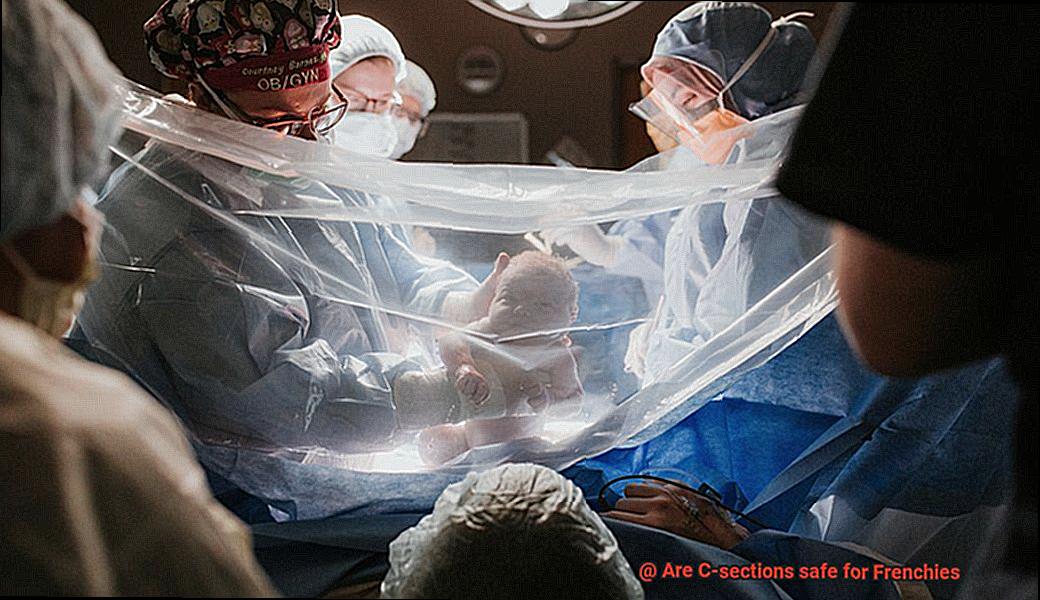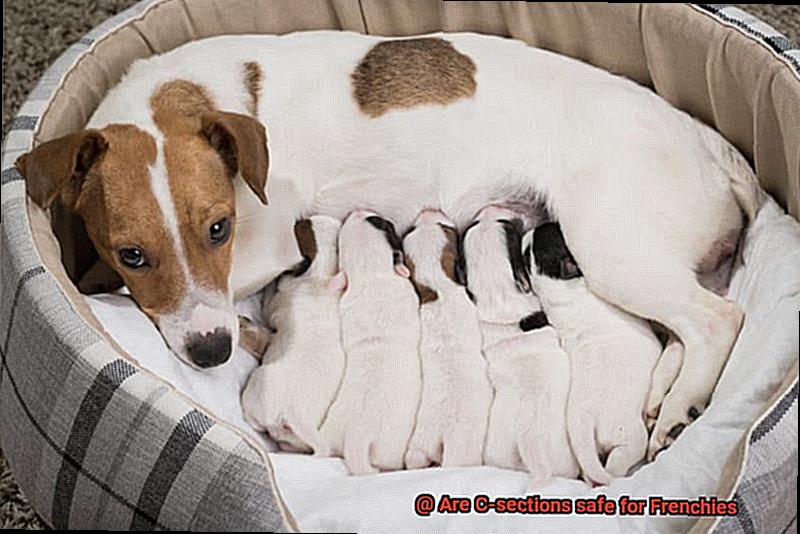Are C-sections safe for Frenchies?
Get ready to dive into a riveting exploration of the safety of C-sections for our adorable furry friends, specifically those lovable French Bulldogs. Lately, it seems like more and more breeders are opting for C-sections to bring those precious puppies into the world. But here’s the burning question: are these surgeries really safe for our Frenchies?
With their squishy faces and irresistible charm, French Bulldogs have stolen hearts worldwide. But their unique body structure and health vulnerabilities make natural birthing a bit tricky. That’s where C-sections come in – a surgical intervention that ensures the well-being of both mama Frenchie and her little ones.
In this blog series, we’re going on an epic quest to uncover the truth about C-sections for Frenchies. We’ll dig deep into why this procedure is gaining popularity, explore potential risks and benefits, and figure out if it’s truly the safest option for these lovable canines.
So if you’ve ever wondered about the safety of C-sections for your beloved French Bulldog, buckle up and join us as we unravel this controversial topic. We’ll combine scientific knowledge with real-life experiences from breeders, vets, and devoted Frenchie owners to make sure we’re making informed decisions for our furry companions.
Let’s get started on this wild ride together – because our Frenchies deserve nothing but the best.
Are C-sections safe for Frenchies
Contents
- 1 Are C-sections safe for Frenchies
- 2 French Bulldogs and the Need for C-Sections
- 3 Potential Risks of C-Sections in Frenchies
- 4 Health Issues that Complicate C-Sections in Frenchies
- 5 Working with Veterinarians to Determine if a C-Section is Necessary
- 6 Risks Associated with Repeated C-Sections in Frenchies
- 7 Strategies to Minimize the Need for C-Sections in Frenchies
- 8 The Importance of Prioritizing Safety and Health During the Breeding Process
- 9 Ensuring Proper Post-Operative Care for Mother and Puppies After a C-Section
- 9.1 Monitor the Mother Frenchie’s Condition
- 9.2 Pain Management is Key
- 9.3 Create a Comfortable Recovery Space
- 9.4 Ensure Proper Nutrition
- 9.5 Keep the Living Area Clean
- 9.6 Provide a Suitable Nesting Area
- 9.7 Monitor Puppies’ Health
- 9.8 Limit Visitors and External Stimuli
- 9.9 Regularly Check the Incision Site
- 9.10 Follow Veterinarian’s Instructions
- 10 Conclusion
French Bulldogs, or Frenchies, are beloved pets known for their adorable looks and friendly personalities. However, due to their unique body structure and genetic predispositions, they may face challenges during the birthing process. One common concern among Frenchie owners is whether C-sections are safe for their pets. In this article, we’ll explore the safety of C-sections for French Bulldogs and discuss the factors that should be considered when determining if this procedure is necessary.
Understanding the Need for C-Sections in French Bulldogs:
French Bulldogs have a relatively large head compared to their body size and a narrow pelvis, making natural birth difficult. These factors increase the likelihood of complications during labor and delivery. As a result, C-sections are often recommended to ensure the health and well-being of both the mother and her puppies.
Factors to Consider:
- Expertise of the Veterinarian: It is crucial to consult with a qualified veterinarian experienced in performing C-sections on French Bulldogs. Their expertise will ensure that the procedure is conducted safely and effectively.
- Overall Health of the Mother: The veterinarian will evaluate the mother’s health before determining if a C-section is necessary. Any underlying health issues or potential complications will be taken into account.
- Pregnancy Circumstances: Diagnostic imaging techniques, such as ultrasound, are used to assess the puppies’ development and determine the optimal time for a C-section. This careful planning maximizes the chances of a successful outcome.
The Safety of C-Sections for French Bulldogs:
When performed by skilled veterinarians in controlled environments, C-sections can be a safe and effective way to deliver French Bulldog puppies. The procedure allows for a controlled delivery, minimizing the risk of birth-related injuries or complications.
Risks and Postoperative Care:
C-sections are major surgical procedures that carry inherent risks, such as infection or adverse reactions to anesthesia. However, with proper preoperative evaluations, meticulous surgical techniques, and postoperative care, these risks can be minimized.
Postoperative care for the mother and puppies is crucial. The mother may require pain management, antibiotics to prevent infection, and close monitoring to ensure her incision heals properly. The puppies may need supplemental feeding or assistance with nursing during the initial recovery period.
French Bulldogs and the Need for C-Sections
French Bulldogs are beloved pets known for their adorable appearance and affectionate nature. However, due to their physical characteristics, they often require special care during the birthing process. In this blog post, we will explore why C-sections may be necessary for French Bulldogs and how they can ensure a safe and successful delivery for both the mother and her puppies.
The Challenges of Natural Birth:
Compact Size and Large Heads:
- French Bulldogs have a compact body structure and large heads, which can make natural delivery challenging.
- The narrow pelvis and broad shoulders of the breed make it difficult for puppies to pass through the birth canal without assistance.
Increased Risk of Complications:
- Natural delivery in French Bulldogs can result in complications such as dystocia (difficult or prolonged labor).
- These complications can endanger the lives of both the mother and her puppies.
Why C-Sections Are Recommended:
Controlled Delivery:
- C-sections involve a surgical procedure where an incision is made in the mother’s abdomen to deliver the puppies.
- This allows for a controlled and efficient delivery, minimizing the risks associated with natural birth complications.
Factors Influencing the Decision:

- The decision to perform a C-section is based on various factors like puppy size, the mother’s physical condition, and pre-existing health conditions.
- If there is a risk of complications during natural birth, veterinarians often recommend a C-section to ensure a safe outcome.
What to Expect During and After a C-Section:
Safety of the Procedure:
- C-sections are generally safe when performed by experienced veterinarians.
- However, like any surgery, there are potential risks such as infection, bleeding, or adverse reactions to anesthesia.
Recovery for Mother and Puppies:
- The mother may need time to recover from surgery and may require pain medication and antibiotics.
- Puppies may need additional care and monitoring to ensure they are healthy and thriving after a C-section.
Post-Operative Care:
- Owners must follow post-operative care instructions provided by the veterinarian.
- This includes keeping the incision site clean, monitoring the mother’s temperature and appetite, and scheduling regular check-ups.
Potential Risks of C-Sections in Frenchies
C-sections, or cesarean sections, are surgical procedures that may be necessary for French Bulldogs (Frenchies) during childbirth. While these procedures can be life-saving for both the mother and the puppies, they also come with potential risks and complications. As an expert in this field, I want to provide you with accurate information about these risks and how to minimize them for your furry friend.
- Anesthesia Complications: Frenchies have unique respiratory challenges due to their brachycephalic skull shape, which can make it harder for them to breathe. General anesthesia used during a C-section can further compromise their breathing. It’s crucial for veterinarians to closely monitor their respiratory function during and after the surgery to ensure their safety.
- Surgical Complications: Frenchies are small in size and have a unique anatomy, which increases the risk of bleeding during a C-section. Surgeons must exercise caution to avoid excessive bleeding and ensure proper wound closure. Complications like accidental damage to organs or blood vessels can also occur during the procedure.
- Infection: Frenchies have adorable skin folds and wrinkles, but unfortunately, these areas can be prone to infection. After a C-section, the surgical site is at risk of infection due to the ideal environment bacteria find in these folds. Proper wound care and monitoring are crucial to prevent infections and promote healing.
- Incisional Hernias: Due to their weakened abdominal muscles, Frenchies may be more prone to developing incisional hernias after a C-section. These hernias occur when tissue or organs push through the incision site. Additional surgeries may be necessary to repair them.
- Challenging Recovery: Recovering from a C-section can be challenging for Frenchies due to their short stature and stocky build. Moving around comfortably after surgery can be difficult for them, so it’s important to provide adequate pain management and support during the recovery period.
It’s essential for Frenchie owners to understand that C-sections should only be performed when necessary for the health and well-being of both the mother and the puppies. To minimize risks, it’s important to choose a skilled veterinarian experienced in performing C-sections on Frenchies. Preoperative evaluation, careful monitoring during and after the surgery, and proper wound care are vital for a successful outcome.
Health Issues that Complicate C-Sections in Frenchies
French Bulldogs, with their adorable wrinkled faces and stocky build, are beloved pets for many. However, they are also known to have several health issues that can complicate the process of a C-section. If you own a Frenchie or are considering breeding them, it’s important to be aware of these potential complications. In this article, we will discuss some of the health issues that can make C-sections more challenging for French Bulldogs.
- Brachycephalic Syndrome: One of the most common health issues in French Bulldogs is brachycephalic syndrome. This condition is characterized by a shortened skull and narrowed airways, which can make it difficult for Frenchies to breathe properly during surgery. It’s important for the veterinary team to take extra precautions to ensure that the dog’s airway remains open and that they receive enough oxygen throughout the procedure.
- Respiratory Problems: French Bulldogs are prone to developing respiratory problems such as tracheal collapse and laryngeal paralysis. These conditions can further compromise their ability to breathe under anesthesia, making the C-section procedure more challenging. The veterinary team needs to closely monitor the dog’s breathing during surgery and be prepared to intervene if necessary.
- Obesity: Another health issue that can complicate C-sections in French Bulldogs is obesity. Frenchies have a tendency to gain weight easily, and this can increase the surgical risks associated with a C-section. Obesity can make it harder for the surgeon to access the uterus and increase the likelihood of surgical complications such as excessive bleeding and wound infections. It’s important for owners to manage their Frenchie’s weight before considering breeding.
- Narrow Pelvis: French Bulldogs often have narrow pelvises, which can make it difficult for them to deliver puppies naturally. This can result in prolonged labor or dystocia, where the puppies are unable to pass through the birth canal. In such cases, a C-section may be necessary to safely deliver the puppies. The veterinary team should be prepared for this possibility and have the necessary equipment and expertise to perform a C-section if needed.
- Anesthesia Risks: French Bulldogs have unique physiology that puts them at a higher risk of developing anesthesia-related complications. They have a higher sensitivity to certain anesthetic drugs and may experience adverse reactions or prolonged recoveries from anesthesia. It’s important for the veterinary team to carefully select and monitor the anesthesia protocol during the C-section procedure.
Working with Veterinarians to Determine if a C-Section is Necessary
Determining whether a C-section is necessary for French Bulldogs requires close collaboration between the owner and their veterinarian. In this blog post, we will explore the factors that veterinarians consider when making this decision, ensuring the safety and well-being of both the mother and her puppies.
Monitoring the progress of the pregnancy is crucial in identifying any potential issues. French Bulldogs have a high rate of dystocia, which refers to difficult or prolonged labor. Regular ultrasounds and physical examinations by a veterinarian can help track the growth and development of the puppies, as well as identify any risks or complications.
The health of the mother is another important factor to consider. Previous difficult deliveries or underlying health problems may increase the likelihood of complications during labor. By closely monitoring the mother’s health throughout her pregnancy, veterinarians can assess any risks and determine if a C-section would be safer for both the mother and her puppies.
Size and position of the puppies also play a role in the decision-making process. If an ultrasound reveals that the puppies are larger than average or not positioned correctly for a natural birth, a C-section may be recommended. This ensures that each puppy can be safely delivered without putting excessive strain on the mother or risking potential complications.
Additionally, the progress of labor itself is taken into account. Prolonged labor can lead to fatigue and distress for both the mother and her puppies, increasing the risk of complications. If a French Bulldog has been in active labor for an extended period without successfully delivering a puppy, it may indicate that a C-section is necessary to provide a safe and efficient method for delivering the remaining puppies.
It is important to note that not all French Bulldogs will require a C-section, and natural deliveries are possible in many cases. Ultimately, the decision to perform a C-section is made on a case-by-case basis, considering the specific circumstances of each French Bulldog’s pregnancy. Working closely with a veterinarian who specializes in reproductive health is crucial for ensuring the safety and well-being of both the mother and her puppies.
Risks Associated with Repeated C-Sections in Frenchies
If you’re considering repeated C-sections for your fur baby, it’s important to understand the potential risks involved. As an expert in French Bulldog health, I want to share some insights with you to help you make an informed decision. So, let’s dive right in.
Complications During Surgery:
With each subsequent C-section, the risk of adhesions increases. These pesky scar tissues can form inside the abdomen, making future surgeries more challenging and risky.
Uterine Rupture:
Repeated C-sections can weaken the uterus, increasing the chances of uterine rupture during subsequent pregnancies. This life-threatening condition poses risks to both the mother and her precious pups.
Breathing Difficulties:
As we know, Frenchies are already prone to brachycephalic syndrome and breathing issues. Repeated C-sections can exacerbate these conditions, putting further strain on their respiratory system.
Prolonged Recovery:
Recovering from a C-section can be tough for any breed, but it’s especially challenging for Frenchies due to their unique anatomy. Short snouts and compromised breathing abilities may make pain management and healing more difficult.
Increased Risk of Infection:
The surgical site is susceptible to bacterial contamination, particularly if proper hygiene protocols are not followed diligently. It’s crucial to work closely with your vet to minimize this risk.
Long-Term Health Impact:
While research on the long-term effects of repeated C-sections in Frenchies is ongoing, some studies suggest that multiple surgeries may have a negative impact on their immune system and reproductive health.
Conclusion:
Before opting for repeated C-sections, consult with a veterinarian experienced in reproductive issues. They can assess your Frenchie’s individual health status, evaluate potential risks, and provide guidance on alternative options such as planned natural deliveries or breeding retirement.
Strategies to Minimize the Need for C-Sections in Frenchies
As an expert in French Bulldog health, I’m here to share some pawsome strategies that can help minimize the need for those dreaded C-sections during your Frenchie’s labor and delivery. We all want what’s best for our furry friends, so let’s dive right into these life-saving tips.
Select Mating Pairs with Care:
To give your Frenchie the best chance at a smooth natural birth, it’s essential to choose mating pairs wisely. Taking into account their body structure, including the size of the head and the width of the hips, can significantly reduce the risk of complications during delivery.
Maintain a Healthy Weight:
Just like us humans, Frenchies need to keep their figures in check too. Obesity in French Bulldogs can lead to complications during pregnancy and delivery. So, ensure your Frenchie maintains a healthy weight through a balanced diet and regular exercise. A trim waistline equals happy puppies.
Regular Veterinary Check-Ups:

Regular prenatal check-ups are a must to catch any potential issues early on. Your trusted veterinarian can monitor your Frenchie’s health throughout pregnancy and provide necessary interventions or management strategies, reducing the likelihood of C-sections.
Prenatal Care is Key:
A well-rounded prenatal care plan is essential for a healthy pregnancy. Make sure your Frenchie receives a balanced diet with adequate supplementation to support her and her growing pups’ nutritional needs.
Choose an Experienced Veterinarian:
When it comes to labor and delivery, having an experienced veterinarian by your side is crucial. Look for a vet who is familiar with French Bulldogs and their unique needs. They’ll be better equipped to handle any potential complications that may arise during delivery.
Create a Stress-Free Environment:
Labor can be stressful for both dogs and humans alike. Creating a calm and stress-free environment for your Frenchie during labor can help facilitate natural birth. Find a quiet and comfortable space where she feels safe and secure.
Be Prepared for Emergencies:
As responsible pet parents, we should always be prepared for the unexpected. Having a well-stocked whelping kit with essential supplies such as towels, sterilized scissors, and umbilical clamps can help address any complications that may arise during delivery. Additionally, knowing the location of the nearest emergency veterinary clinic is crucial in case immediate medical attention is needed.
The Importance of Prioritizing Safety and Health During the Breeding Process
Breeding French Bulldogs can be a complex and risky process, especially when it comes to the delivery of their puppies. Due to their unique anatomy and potential health issues, many French Bulldogs require C-sections to safely deliver their puppies. In this article, we will explore why prioritizing safety and health during the breeding process is essential for French Bulldogs.
Ensuring the Health of the Breeding Pair:
The safety and health of both the mother and the puppies should always be the top priority during the breeding process. This starts with ensuring that the breeding pair is healthy and free from any genetic or hereditary conditions that could be passed on to the offspring. Thoroughly assessing the health and reproductive capabilities of both the male and female French Bulldogs is crucial. This may involve conducting various tests, such as genetic screenings, hip evaluations, and overall health checks.
Working with a Reputable Veterinarian:
It is crucial to work with a reputable and experienced veterinarian who specializes in reproductive medicine. They will be able to provide guidance throughout the breeding process, including determining the optimal time for breeding, monitoring the pregnancy, and assessing the need for a C-section. A skilled veterinarian will have the expertise to handle any complications that may arise during the breeding process.
Understanding the Need for a C-Section:
French Bulldogs are known for their narrow hips and large heads, which can make natural delivery difficult or even impossible. This puts both the mother and the puppies at risk of injury or even death during birth. Therefore, a C-section is often the safest option for delivering the puppies without compromising their well-being. It is important to be prepared for the possibility of a C-section and have a plan in place to ensure the safety and well-being of both the mother and the puppies.
Managing Risks Associated with C-Sections:
While C-sections are generally considered safe for French Bulldogs, there are inherent risks associated with any surgical procedure. The anesthesia can pose risks to the mother, and there is always a chance of infection or complications during recovery. However, these risks are usually minimal when performed by a skilled veterinarian in a controlled environment. Proper post-operative care is essential to ensure the mother and the puppies recover well.
Ensuring Proper Post-Operative Care for Mother and Puppies After a C-Section
Ensuring Proper Post-Operative Care for Mother and Puppies After a C-Section
After a C-section, both the mother Frenchie and her puppies require special attention and care to ensure their recovery and well-being. Here are some important tips to help you provide the best post-operative care for your furry family members.
Monitor the Mother Frenchie’s Condition
Keep a close eye on the mother Frenchie for any signs of infection or complications. Check her incision site regularly for redness, swelling, or discharge. If you notice anything unusual, contact your veterinarian immediately.
Pain Management is Key
Help ease the mother Frenchie’s discomfort by following your veterinarian’s instructions regarding pain medication. This will aid in her recovery and overall well-being.
Create a Comfortable Recovery Space
Provide the mother Frenchie with a quiet and comfortable area where she can rest and recover. Limit her physical activity to prevent strain on her incision site.
Ensure Proper Nutrition
To support the mother Frenchie’s recovery and milk production, provide her with a high-quality diet and fresh water. Monitor her appetite and consult with your veterinarian if she shows a lack of interest in food.
Keep the Living Area Clean
Maintain a clean and sanitized living area for the mother Frenchie to reduce the risk of infection. Regularly change bedding and promptly clean any soiled areas.
Provide a Suitable Nesting Area
Create a warm and cozy nesting area for the mother Frenchie to nurse and care for her puppies comfortably. Make sure it is free from drafts and external stimuli that may cause stress.
Monitor Puppies’ Health
Regularly check the puppies’ weight gain to ensure they are thriving. If any puppies appear weak or have difficulty nursing, seek guidance from your veterinarian.
Limit Visitors and External Stimuli
During the initial recovery period, minimize visitors and external stimuli to create a calm and quiet environment for the mother Frenchie and her puppies.
Regularly Check the Incision Site
Continue to monitor the mother Frenchie’s incision site for any signs of infection. Contact your veterinarian immediately if you notice any abnormalities.
Follow Veterinarian’s Instructions
Adhere to your veterinarian’s post-operative care instructions diligently. This may include additional medications, wound care procedures, or follow-up appointments.
6L1EtOazej0″ >
Conclusion
In conclusion, it is crucial to consider the safety of C-sections for Frenchies. While this procedure can be a life-saving option for both mother and puppies in certain cases, it should not be taken lightly. Consulting with a trusted veterinarian who has experience with French Bulldogs is essential to ensure the best possible outcome.
When it comes to any surgical procedure, there are always risks involved. French Bulldogs, with their unique anatomy and predisposition to certain health issues, may face additional challenges during a C-section. These include potential complications such as anesthesia sensitivity, increased risk of infection, and longer recovery time.
However, when performed by skilled professionals in a controlled environment with proper pre-operative evaluations and post-operative care, the risks can be minimized. It is important to choose a reputable veterinary clinic that adheres to strict protocols and has a track record of successful C-sections in French Bulldogs.
Moreover, it is crucial for dog owners to recognize the signs that may necessitate a C-section. If a Frenchie mother is experiencing prolonged labor or distress, if her puppies are too large or positioned incorrectly in the birth canal, or if there are any other indications of potential complications, prompt action should be taken.
Ultimately, the decision regarding whether or not to proceed with a C-section should be made on a case-by-case basis by weighing the risks and benefits alongside professional advice. It is always better to err on the side of caution when it comes to the well-being of our furry friends.
In summary, while C-sections can be safe for Frenchies under appropriate circumstances and with proper care, they should not be seen as routine procedures. The health and safety of both mother and puppies should always be prioritized above all else.




